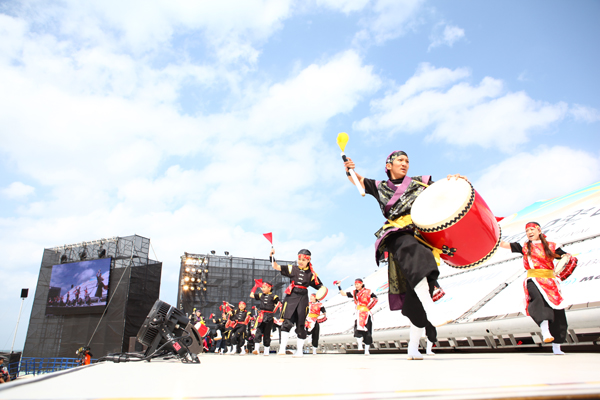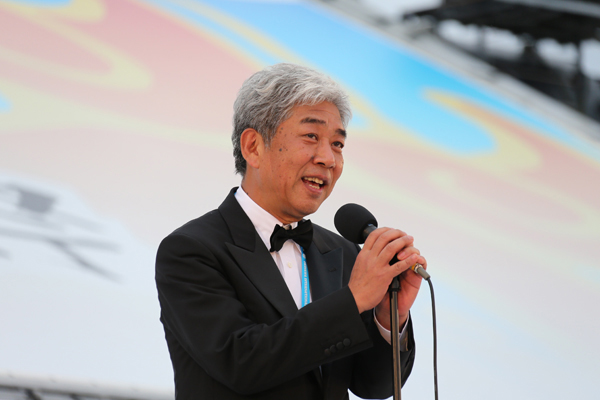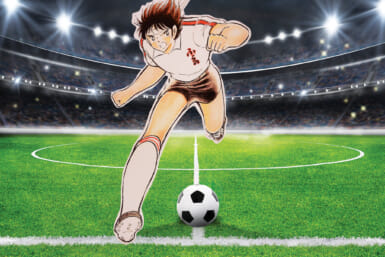Film fans and journalists flocked to Okinawa for International Movie Festival at the end of March this year, but the occasion – and the eyes of the audience – was by no means entirely focused on the big screen. Its organisers have big plans for the islands…
Yoshimoto Kogyo is a behemoth of the Japanese entertainment industry. Formed in 1912 as a theatre management company in Osaka, the business has grown to become one of the largest agencies in the world, boasting a roster of around 6,000 entertainers – some you’ll know, some you won’t.
Hiroshi Osaki (pictured above) is at the head of the company as CEO and Chairman as well as being the Committee President of the Okinawa International Movie Festival, at which Weekender sat down with him this month. We wanted to find out more about why an Osaka-based company was so interested in Naha.
Osaki credits one half of Yoshimoto’s most popular comedy double act as a catalyst for the formation of the festival which has grown to a yearly event which takes over conference halls, a seafront park and beach to become one of the most talked about events in Okinawa:
“When Hitoshi Matsumoto’s ‘Big Man Japan’ was invited to Cannes, I went to the festival and it made a big impression on me. It was a beautiful event and me and my staff had a lot of fun,” he says. “We liked it so much we wanted to come every year, but obviously couldn’t. So we launched a festival of our own.”
The Okinawa Film Festival is now in its fifth year and it has been steadily expanding since its inception, with more artists, acts and films than ever before in 2013. Further expansion – not only in scale but in range of sectors it can influence – is planned for the future:
“The first step would be to push it up a level as a film festival, but also as a place for press and filmmakers to spend time together and network,” Osaki says. “Hopefully, I’d like to set up some kind of entertainment school here for the industry. For writers, cameramen, artists (and) a wide range of producers in the creative industry. A college set up, so people can produce and write films, write comic books, whatever.”
The aim is to create an “Asian entertainment hub that can help sustain the island’s economy: starting something from nothing in the desert, the way Las Vegas was built.”
The ‘Owarai’ style of comedy is hugely popular in Japan and new ‘tarento’ (talent) spring up on a seemingly weekly basis, sometimes to enduring popularity but often to disappear as quickly as they arrived. Of the Yoshimoto schools currently training young hopefuls, Osaki says, “It’s not so much about teaching and learning, it’s more about providing an environment where people who are talented and interested in comedy can get together with a similar discipline or style, an environment so they can learn from each other and also become competitive with each other.”
When discussing Okinawa and his company’s plans for the area, the agency president has a surprisingly balanced perspective, not raving about its qualities but recognising its untapped potential. Osaki has previously spoken to Hollywood Reporter magazine of his company’s desire to create an “Asian entertainment hub that can help sustain the island’s economy: ‘starting something from nothing in the desert, the way Las Vegas was built.’” He has said he would like the islands to reduce their dependency on US military bases, which occupy a fifth of its land.
Having first visited the islands 25 years ago as a new employee of Yoshimoto Kogyo, he doesn’t see Okinawan life as having greatly improved over the years: “It’s a difficult question to answer: ‘has life in general got better?’ ‘Has the quality of life got better?’ The problem of the US base persists and still some people believe that mainland Japan doesn’t care about Okinawa and they forget that (Okinawan people) are still struggling with this problem, so there are good and bad points, pros and cons (to life here).”

As the huge 26.65m x 14.76m screen on the beach (imported specially from Switzerland) took a break during the day, comedians and entertainers looked after the crowd admirably
In regards to the base, a pragmatic solution is favoured: “The relationship between Japan and the US needs to be sustained for various other reasons, so it’s just a case that Okinawa has all the bases, and they should be spread out across Japan so that the burden is less for Okinawa.”
Osaki-san is dressed down today (we meet on the fourth day of the festival) and this look is not uncommon; he can often be seen at the festival’s parties relaxing in a T-shirt and grey hoodie, a stark contrast to the typical image of an upper level corporate boss.
There is a buzz around the festival that could perhaps not exist anywhere else, but when asked for qualities that make Okinawa special as a location Osaki is fairly low-key in his praise – it seems fitting, in some ways, with what is a perceptively modest, slow pace of life here:
“The weather is nice, so you can take a walk and enjoy the scenery.” He is hardly gushing with reasons on why someone would want to start a festival here – perhaps he can sense we don’t need to be persuaded… “Well, Okinawa is the closest location in Japan to the rest of Asia, so it’s a good place for everyone to get together and just have fun once a year.”
There is the nub: filmmakers as well as TV crews and journalists have come just as far if they flew from Taiwan as from Tokyo, for example, and we return briefly to the idea that the islands can be a ‘creative hub’ for Asia, not only for Japan. But there is a caveat.
“I don’t mean to separate Okinawa from the Japanese mainland, but it has a very distinctive history and, as you know, it was a battleground during the second world war, so there is a delicate relationship between Okinawa and mainland Japan. They always get the feeling that the ‘mainland Japanese’ are barging in with their shoes on; I have to be careful when I come here, it’s a delicate balance, sometimes I love it, sometimes I say I’ll never come back again.”
“Everything is so centralised in Tokyo that people tend to forget that there are other things going on outside”
This year the festival managed to attract Hollywood director Joel Schumacher to take on the duty of Jury Head for the Special Competition. When asked who he would like to get next year, Osaki says, “I think it’s most important to get who the Okinawan kids want to see!” This isn’t a surprising answer when you take into account the tremendous crowds that have been present, in particular to attend the opening red carpet ceremony and the concerts and stage appearances on the final day. Though there is a clear focus on industry and creativity behind the scenes, this is a populist event at heart:
“It’s not that we’re aiming for a big ceremonial red carpet event with stars and directors actually, what we’re trying to do is more loose and fun … As long as the locals like it, that’s what we want.” It seems that a lot of the categories and projects related to the festival are aimed at the people of Okinawa, “Everything is so centralised in Tokyo that people tend to forget that there are other things going on outside, and even if they hear it they don’t really think about it, so its important to spotlight certain local communities and present what’s going on.”
I wonder who Osaki’s personal favourites are, starting with comedians within the company, but he is diplomatic – and good-natured: “Everybody! Downtown, Ninety-nine, people like that…”
The CEO, who cites 80s legend John Belushi along with The Three Stooges as all-time influences, is not a stranger to comedic performance himself, and is often quite funny when put on stage and handed a microphone – he even delivered some hilarious digs at Government officials who he feels have failed to support the festival during the closing ceremony.
Looking at the festival’s competition, which had two categories, ‘Laugh’ and ‘Peace’ we wondered where Osaki would place a film of his life, would it be a comedy or a drama? “A slapstick comedy!” He seems to enjoy the question: “Full of missed opportunity and things like that! Relationships, clients, and other things, but it would have a happy ending.”
It’s good to see that even within the strict corporate world of Japan, the head of an agency for comedians can retain a sense of humour. And who would play the CEO, Chairman and Organisation Committee President’s leading lady? “Kyary Pamyu Pamyu!”
Images © 2013 Okinawa International Movie Festival / Yoshimoto Laugh & Peace









